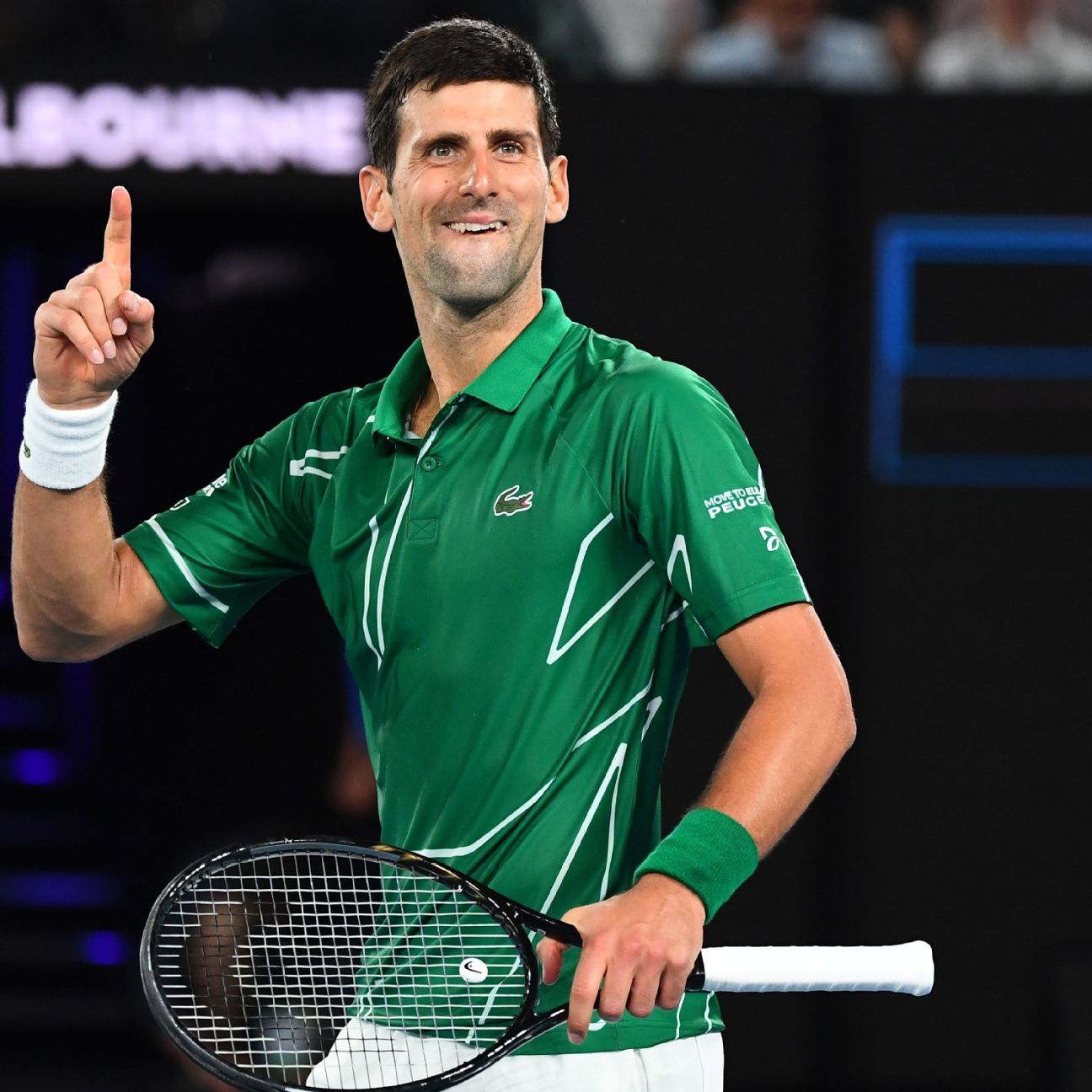
MELBOURNE, Australia -- Novak Djokovic was wondering, right along with everyone else, what sort of shape Roger Federer would be in for their Australian Open semifinal.
Federer, 38, despite dealing with a painful groin muscle and coming off a draining five-setter, came out just fine, it seemed, and soon was up 4-1 and love-40, holding a trio of break chances as Djokovic served.
Didn't last. Federer couldn't sustain that level. Neither his body nor Djokovic would let him.
Casting aside a bit of a poor start during the rivals' 50th meeting, Djokovic stretched his Grand Slam winning streak against Federer to six in a row with a 7-6 (1), 6-4, 6-3 victory Thursday night that earned the defending champion a record eighth trip to the final at Melbourne Park.
"Today was horrible, to go through what I did. Nice entrance. Nice sendoff. And in between, it's one to forget, because you know you have a 3% chance to win," Federer said, adding that he discussed beforehand with his team how bad things would need to get for him to stop playing. "Once you can see it coming, that it's not going to work anymore, it's tough."
Djokovic now leads their head-to-head series 27-23, including 11-6 at majors. Federer hasn't beaten him at one of the sport's four most important tournaments since 2012.
"I just want to say, respect to Roger for coming out tonight. He was obviously hurt," Djokovic said. "Wasn't at his best."
The No. 2-seeded Djokovic will try to collect a record-extending eighth Australian Open title on Sunday against No. 5 Dominic Thiem or No. 7 Alexander Zverev.
Djokovic also can claim a 17th major trophy overall to move closer to Federer's record of 20. Rafael Nadal, beaten by Thiem in the quarterfinals, is at 19.
Clearly, for Djokovic vs. Federer, everything hinged on the first hour or so.
They played on a muggy, sweltering evening, with the temperature in the high 90s (high 30s Celsius) and no breeze to offer respite.
Almost from the moment his wild quarterfinal ended Tuesday after he'd saved seven match points and eked past Tennys Sandgren in five sets, speculation swirled about how well Federer would recover.
Might the muscle issue force him to pull out of the tournament? Why didn't he practice Wednesday?
As it happens, Federer showed up, of course. And gave what he could until the end.
He's never handed an opponent a walkover across more than 400 Grand Slam matches, never retired from any of his more than 1,500 career tour-level matches.
"I don't think I would have gone on court if I had no chance to win," Federer said. "We saw I was still able to make a match out of it."
Indeed, Federer appeared to be managing just fine at the outset.
And, oh, did this match set out well, in terms of the atmosphere, in terms of the tension, in terms of the tennis.
The proceedings began with a jolt of a 14-point game as a fugue of "Let's go, Roger!" and "No-le! No-le!" provided the soundtrack, prompting chair umpire Nico Helwerth to passively aggressively admonish spectators: "Please. Thank you."
There was an exchange of 17 strokes. Another of 15. There were two break points for Djokovic, nullified with the help of formidable serves. Federer took the game with three aces, three other clean winners and then broke to go up 2-0 on his way to 4-1.
Soon it was nearly 5-1 in Federer's favor. Close doesn't count, though.
Djokovic put up too much resistance, much like during their epic Wimbledon final last July, when he thwarted two championship points for Federer and wound up winning in a fifth-set tiebreaker.
This time, Djokovic said, "I managed to dig my way back."
After Djokovic got out of that love-40 hole to hold, he trailed 5-2 and love-30.
But Djokovic picked up 10 consecutive points to not only hold there but also break at love in the following game as Federer, one of the most effective servers ever, served for the set. At love! Imagine that.
In the eventual tiebreaker, Djokovic did what Djokovic does: No mistakes and four pure winners, including a down-the-line backhand return to end it.
At the break, Federer took a medical timeout and went off court with a trainer, like he did against Sandgren. Djokovic stayed on the sideline while he, too, got checked out.
When play resumed, Federer did not look as spry or confident as in the first set. He tried shortcuts such as pushing forward on returns or less-than-ideal drop shots. He couldn't generate so much as one break chance.
Djokovic took the set with a final-game break and the last two points were spectacular.
First, he followed up a stinging return by heading far to his left for a sprinting, sliding, stretching cross-court backhand passing shot; he probably shouldn't even have put his racket on the ball, let alone managed to win the point.
Then he reacted to a short shot by Federer by running all-out to flip a cross-court forehand pass that made it two sets to none. Djokovic threw an uppercut and bellowed, "Come on!"
They played for another half-hour or so but all that was left to decide was the score, not who would win.
"He was better on the day today," Federer said, "no question."















 Phone: (800) 737. 6040
Phone: (800) 737. 6040 Fax: (800) 825 5558
Fax: (800) 825 5558 Website:
Website:  Email:
Email: 






